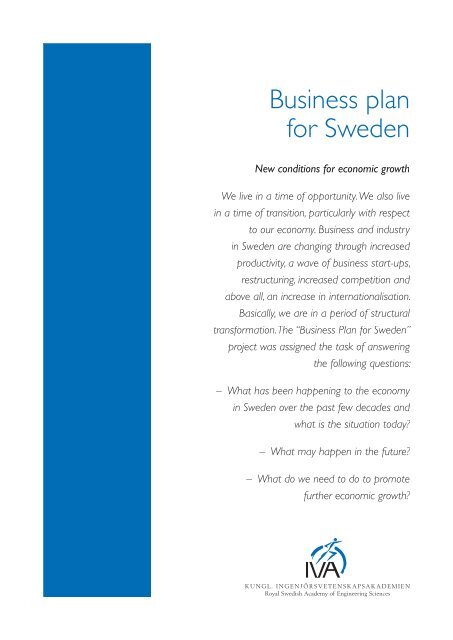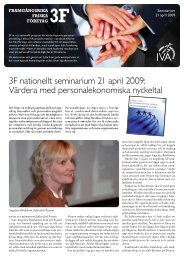Information folder (pdf) - IVA
Information folder (pdf) - IVA
Information folder (pdf) - IVA
- TAGS
- information
- folder
- www.iva.se
Create successful ePaper yourself
Turn your PDF publications into a flip-book with our unique Google optimized e-Paper software.
Business plan<br />
for Sweden<br />
New conditions for economic growth<br />
We live in a time of opportunity. We also live<br />
in a time of transition, particularly with respect<br />
to our economy. Business and industry<br />
in Sweden are changing through increased<br />
productivity, a wave of business start-ups,<br />
restructuring, increased competition and<br />
above all, an increase in internationalisation.<br />
Basically, we are in a period of structural<br />
transformation. The “Business Plan for Sweden”<br />
project was assigned the task of answering<br />
the following questions:<br />
– What has been happening to the economy<br />
in Sweden over the past few decades and<br />
what is the situation today?<br />
– What may happen in the future?<br />
– What do we need to do to promote<br />
further economic growth?
Percentage of jobs per sector in 2003.<br />
Source: New Facts and Statistics, Business<br />
Plan for Sweden, Nutek. No. 1 December<br />
2005.<br />
Industry in Sweden yesterday<br />
and today<br />
Figure 4. Average annual productivity<br />
growth 1995-2003<br />
It is important to be competitive in an international perspective to promote<br />
development, create more job opportunities and generate growth. Another<br />
important question to ask is: Where will the new jobs come from and how<br />
will this happen? Today we have a good understanding of what has happened<br />
to the economy over the past decade, what it looks like today and what<br />
may take place over the next decade. We do not, however, know everything<br />
about the future. This would be impossible. The future will be shaped by<br />
how we act today and as we move forward based on our understanding<br />
of the priorities for the future. We have some suggestions regarding what<br />
might be worth pursuing in order to be better prepared for the future.<br />
Care sector, 17%<br />
The state of Swedish companies is good. They are competitive in the international<br />
arena, they are highly productive and are demonstrating good<br />
growth. At the same time, the globalisation trend is considerable and in sectors<br />
particularly exposed to international competition, such as “technology<br />
companies” and “medicine and life sciences,” growth and productivity are<br />
high. For sectors that focus on domestic markets, such as the construction<br />
industry and labour-intensive services, growth and productivity are lower.<br />
Labour-intensive services<br />
Construction industry<br />
Care sector<br />
Consulting<br />
Education<br />
Industry as a whole<br />
Infrastructure services<br />
Raw materials and proces-<br />
sing industry<br />
Commerce<br />
Medicine and live sciences<br />
Technology companies<br />
Consulting, 5%<br />
Education, 11%<br />
Government<br />
agencies<br />
and<br />
organisations,<br />
7%<br />
Unknown,<br />
2%<br />
Labour-intensive<br />
services, 9%<br />
Raw materials<br />
and processing<br />
industry,<br />
7%<br />
Infrastructure<br />
services, 11%<br />
Technology<br />
companies,<br />
12%<br />
Medicine and life<br />
sciences, 1%<br />
Construction<br />
industry, 6%<br />
Commerce,<br />
12%<br />
-1 0,0 1,0 2,0 3,0 4,0 5,0 6,0 7,0 8,0<br />
Per cent<br />
NB: Labour productivity growth is defi ned as the change in volume in the value added divided by the change in the<br />
number of hours worked.<br />
Source: SCB Nutek’s analysis
Business in the future<br />
It is also clear that a new development trend is affecting the growth of industry,<br />
since much of the growth in employment is in the service industries.<br />
Furthermore, many manufacturing companies are increasingly regarding<br />
themselves as service companies. The growth of employment in the Swedish<br />
service industries is, however, still weak in comparison to other countries.<br />
Growth in Swedish industry is still associated with development of older<br />
and more mature companies. New businesses and small and medium-sized<br />
companies have not developed to the same extent. The business climate in<br />
Sweden is more conducive to support for the growth of established structures<br />
rather than the dynamics of emerging industries and small and mediumsized<br />
companies. It is the experience of more and more small companies<br />
that government rules and requirements are increasingly impeding their<br />
growth.<br />
The atmosphere among Swedish businesses is very dynamic. It is clear<br />
that new enterprise is on the rise and that more and more individuals are<br />
considering launching new ventures. There is also a positive link between<br />
the creation and closure of places of work. In new emerging sectors there is<br />
considerable turbulence and companies are reinventing themselves. This is<br />
particularly obvious in the consulting and labour-intensive service sectors.<br />
We still need to close the gap between peoples’ desire to start a company<br />
and their ability to actually support themselves as entrepreneurs. The number<br />
of people actually supporting themselves as business owners in Sweden<br />
is lower today than in 1995.<br />
An empirical analysis of Swedish companies shows that there are three<br />
clear challenges for Sweden:<br />
• Sweden has not fully unleashed the job-creating power of the service<br />
society.<br />
• New companies as well as small and medium-sized ones are demonstrating<br />
the weakest growth in Sweden, which means that the country<br />
continues to be dependent on growth in older, mature sectors.<br />
• Despite the increase in new enterprise, Sweden needs greater incentives<br />
for individuals to choose to develop businesses and support themselves<br />
as entrepreneurs.<br />
When entrepreneurs and individuals who understand the long-term competitive<br />
potential of business have the chance to speak out, there are a number<br />
of common factors in their views on the future. The challenges facing Swedish<br />
companies can be categorised into fi ve issues:<br />
• Internationalisation will continue. Sweden’s economic future will involve<br />
exploiting the possibilities afforded by internationalisation. Sweden has<br />
the potential to do this, but this means that Sweden in the future needs to<br />
focus even more on transparency and the ability to change and adapt.<br />
• Competence. Almost all interviews and seminar discussions present the<br />
same picture: gaps in competence and the lack of knowledgeable customers<br />
with high expectations is a major threat for Sweden in the long<br />
term.<br />
• “Servicisation” of more and more sectors of the economy. The “servicisation”<br />
trend shows that there is a different type of development in play<br />
on the market than in the past, where the focus is on the importance of<br />
business development.
Number of Swedish company acquisitions<br />
outside Sweden 1989-2004<br />
Proposed measures<br />
• Organisation development. There is consensus among the business leaders<br />
interviewed that, in the future, organisational innovation will be as<br />
important as technical innovation.<br />
• The signifi cance of customers and brands. An important competitive factor<br />
in the future will be focusing on developing brands. Increasing the<br />
customer value of a product or service and involving the consumer or<br />
end customer in development work is seen as crucial.<br />
140<br />
120<br />
100<br />
80<br />
60<br />
40<br />
20<br />
0 1989 1990 1991 1992 1993 1994 1995 1996 1997 1998 1999 2000 2001 2002 2003 2004<br />
Source: Thomson<br />
Sweden is facing major challenges that, to some degree, confl ict with traditional<br />
values. Much of the growth in employment in the future will, for<br />
example, very likely be in the service industry, although the traditional and<br />
major industries in Sweden will continue to be important for economic<br />
growth. It is therefore clear that policies are needed that support the growth<br />
of new industries and, at the same time, support the established corporations<br />
in their efforts to develop. It would be unfortunate if these two groups<br />
were pitted against each other. The nine proposals are as follows:<br />
Increase investment in lifelong learning<br />
Proposals: Additional and vigorous initiatives are needed in the area of<br />
competence development in Sweden. Competence development initiatives<br />
should, to a greater extent than today, be aimed at and adapted to the future<br />
needs, and particularly the international needs of industry. If this is to<br />
happen, we need greater interplay and more distinct division of responsibilities<br />
between the players in the “education infrastructure.” The quality of<br />
vocational programmes and higher education also needs to be improved.<br />
Finally, the labour market players should join forces to develop a system<br />
for “individual competence development” taking into account the needs of<br />
industry as well as the individual.<br />
Increase the Government’s civil initiatives in research to at least 1 per cent of the<br />
BNP and provide incentives for universities to engage in entrepreneurial activity.<br />
Proposals: Bearing in mind future competition and in relation to critical<br />
mass requirements within various sectors, the resources that are being invested<br />
in research in Sweden are too limited. Government investment in civil<br />
research therefore needs to be increased as soon as possible and brought<br />
in line with the previously established goal of 1 per cent of the GNP, and<br />
signifi cantly more in the future. Investment is needed in areas such as IT and<br />
telecoms, automotive engineering, medicine and life sciences, care, energy<br />
and the environment, forestry and materials. Faculty grants should also be
increased. Resources should be invested in making small and medium-sized<br />
companies more actively involved in research & development, and ensuring<br />
that research results are available to these types of companies. There should<br />
be a focus on development and utilisation of services and other cross-border<br />
knowledge areas. Create stronger ties between Swedish initiatives/Swedish<br />
players and European research funding. Develop research tools to create<br />
more market pull in the research system. This could be done through greater<br />
economic freedom and by allowing universities to have a more independent<br />
and active role as players in the innovation system.<br />
Promote growth and job opportunities within labour-intensive services<br />
Proposals: Enable service operations, such as retail, restaurant and tourism,<br />
to grow. To make this possible, the regulatory frameworks that prevent<br />
these companies from growing to the same extent as their counterparts in<br />
other countries need to be reviewed. An example of a regulatory change<br />
would be allowing working hours to be adapted so suit customer and business<br />
needs. The way in which the rules and supervisory controls dictated by<br />
the authorities are applied also needs to be reconsidered, e.g. the municipal<br />
plan processes. There are currently strategy programmes in place for different<br />
sectors of industry that have been produced jointly by politicians and<br />
industry. Similar initiatives need to be developed for the service sector. This<br />
should be regarded as a fi rst step towards dealing with future international<br />
competition.<br />
Promote opportunities for entrepreneurship within the care sector<br />
Proposals: The primary consideration of healthcare is to provide welfare<br />
to the country’s citizens. It is therefore especially important to be able to<br />
increase productivity and cost effectiveness. The fact that there are many<br />
healthcare providers in addition to the public providers means that there are<br />
opportunities to increase effi ciency gains. Society can choose to take these<br />
effi ciency gains in the form of cost savings or use them to fi nance additional<br />
welfare services. Even if the care sector today is different to other markets,<br />
there is still considerable growth potential which society needs to utilise.<br />
We believe that this is best done by reviewing the sector’s regulations so that<br />
people can continue to rely on the fact that the Government will live up to<br />
its responsibility at the same time as we utilise the creativity and knowledge<br />
of a number of different players.<br />
Facilitate internationalisation of the service sectors<br />
Proposals: Swedish growth is closely related to the ability of Swedish companies<br />
to compete and expand outside the country. This, of course, applies<br />
to all industries, but at this time it is particularly important to emphasise<br />
the internationalisation of the service industries. Sweden has a number of<br />
service industries with world-leading expertise but where the level of internationalisation<br />
is low, particularly within the “care sector,” “education,”<br />
“consulting” and “labour-intensive services.” It is important for these new<br />
and growing service industries to be exposed to competition and to be internationalised<br />
early on along their development path. If this does not happen,<br />
they risk being driven out of the market by competition from players from<br />
other countries. To speed up the process of internationalisation, a number<br />
of regulatory issues need to be addressed. Of particular importance is the<br />
service directive being discussed within the EU. The Government should act<br />
to increase competition in the service markets. Work on the Bologna Process<br />
– a harmonisation of parts of the education sector within the EU –is another<br />
area to focus on. This process is an important factor in increasing mobility<br />
among students.
Overhaul the tax system<br />
Proposals: A general review is needed of the tax system so that it can form<br />
a solid foundation for industry in the future, can be internationally competitive<br />
and can fi nance welfare systems. Internationalisation is putting new<br />
types of pressure on the tax system.<br />
Associate increased mobility with individual security, security in transition<br />
Proposals: The various labour market players should work together to produce<br />
a strategy that stimulates change in the labour market. They should<br />
agree on introducing solutions in Sweden that involve increased fl exibility<br />
in the labour market while increasing individual security. Develop solutions<br />
at the same time as investments in skills development are increased. First<br />
and foremost, it is necessary to encourage small companies in Sweden to be<br />
willing to risk taking on new employees.<br />
Guarantee the long-term energy supply<br />
Proposals: An important measure in creating the necessary conditions for competitive<br />
industry is to guarantee the long-term energy supply. Sweden needs a longterm<br />
energy policy for a number of reasons, one of which relates to the major<br />
advances that have been made in the fi elds of nuclear power, solar energy, oil, coal<br />
and biofuels. Industry, energy companies, government agencies, research players,<br />
professional and industrial organisations and politicians should therefore join forces<br />
to agree on a long-term energy policy to guarantee Sweden’s energy supply.<br />
The challenge is, on the one hand, to manage today’s energy and environmental<br />
issues, and on the other, to establish reasonable energy price levels for Sweden’s<br />
citizens and industries. Competition in the energy producer market must be<br />
deregulated and strengthened. Transmission capacity needs to be improved, both<br />
within the Nordic region and between the regions in Europe. At the same time,<br />
the system of emission rights must be changed without delay so that the costs<br />
do not force marginal pricing on electricity.<br />
Form a globalisation council to focus on and strengthen industry’s long-term<br />
development and competitiveness<br />
Proposals: Sweden is facing major challenges and the international structural<br />
transformation requires a far-sighted and well-established economic<br />
policy. A consistent and long-term focus on the challenges facing Sweden<br />
is needed. An international development council would provide the Government<br />
with a valuable platform from which to establish economic policies<br />
and could provide advice on important economic policy issues. The<br />
council should include political decision-makers and representatives from<br />
companies, unions, and from the education and research sector. The council<br />
should be commissioned to analyse and interpret the signifi cance of deregulation<br />
and other important international trends, and to present proposals<br />
for measures that should be implemented to enable industry to more easily<br />
change and adapt and provide the necessary conditions for new industries<br />
to emerge.<br />
STEERING COMMITTEE

















